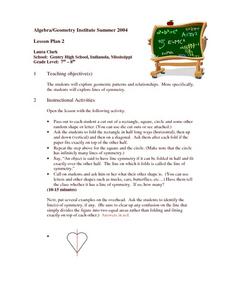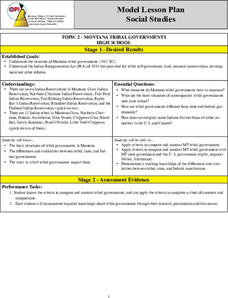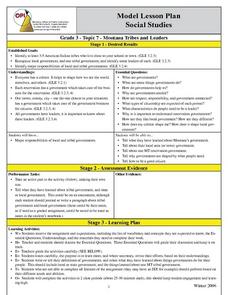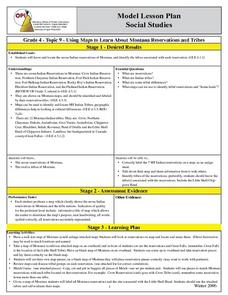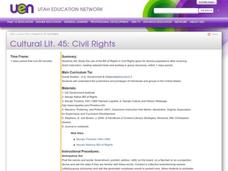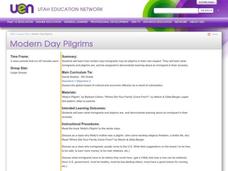Curated OER
Fur Trade Economics
Students demonstrate understanding of what the fur trade was and how it was operated, including the bartering process, by participating in a mock trade activity and assessing the value of items based on their needs and wants.
Curated OER
Bill of Rights
Students research, list, define and discuss all the aspects to the United States Bill of Rights. They assess their foundations by James Madison and Thomas Jefferson and reflect on all the conditions happening at the time period of...
Curated OER
At the Crossroads
Third graders explore where South Africa is and then research details about the country to fully assess the background to the book, "At the Crossroads." They receive a map of Africa and color in the country of South Africa and list five...
Curated OER
Exploring Lines of Symmetry
Students investigate the concept of symmetry. They use cut out shapes that are folded in order to practice identifying the lines of symmetry. The lesson is observed by the teacher working with students for the purpose of scaffolding and...
Curated OER
The First Americans Today
Fourth graders identify at least one similarity and at least one difference in the following categories: celebrations, daily activities, values and beliefs, other.
Curated OER
The African-American Struggle for Equality in the World War II Era
Students respect and appreciate the challenges people faced during World War II. They develop the different perspectives on race during WWII. Students develop that the nation's actions may not exemplify a nation's stated ideals. Students...
Curated OER
Montana Tribal Governments
Students engage in a research instructional activity to find out more information about tribal governments. The instructional activity includes guiding questions to help in the research process. They complete a chart of comparisons and...
Curated OER
Montana Tribes And Leaders
Third graders investigate the different indian tribes in the state of Montana. They conduct research to answer essential questions. The focus of the information gathering is concerning tribal government. Students create a graphic...
Curated OER
Montana Reservations And Tribes
Fourth graders engage in a lesson in order to find the differences or similarities within seven tribal groups in Montana. They use maps and other resources to find cultural and geographical differences. The influences upon culture are...
Curated OER
The U.S. & Navajo Bills of Rights
Students are introduced to the United States and Navajo Bill of Rights. In groups, they compare and contrast the two documents and take notes to share with the class. To end the lesson, they write in their journals about their own...
Curated OER
Civil Rights
Students are introduced to the concept of Civil Rights. In groups, they use a timeline of the Navajo tribe to identify the ways the tribe has made advances in Civil Rights throughout the years. To end the lesson, they take notes and...
Curated OER
Thanksgiving and Agriculture
Students listen to the book "The Pilgrim Story" and discuss the Pilgrims and why they came to America. Students role play the Thanksgiving story and write about how Pilgrims and Indians relate to them today.
Curated OER
The Sweetgrass Hills of Montana
Fifth graders investigate the indian land areas of Montana. They focus the research upon finding why indian tribal beliefs is tied to the land. Students also find information about the oral history of the people. Then they answer review...
Curated OER
Steps To An Inquiry Process
Fourth graders investigate the research process. The finding of information about the indian tribes of Montana provides the context for student practice. They identify the problem and generate questions to find answers. The main...
Curated OER
Immigration in the United States from 1880-1910
Eleventh graders explore, examine and study immigration in the United States from 1880-1910. They identify different aspects of the American immigration movement. Each student also shares where their ancestors are from and their...
Curated OER
Christopher Columbus: Historical Perspective
Sixth graders study Columbus Day in relation to who discovered Canada. They complete a KWL about Canada and discuss Columbus Day as an American holiday. After viewing a video, they read articles of Christopher Columbus and work in groups...
Curated OER
Modern Day Pilgrims
Young scholars examine the similarities and differences between modern day immigrants and pilgrims. They listen to stories, discuss their ancestors' origins, and create a native costume for a paper doll for where their ancestor is from.
Curated OER
Westward Expansion - Fur Trade
Students complete a unit of lessons to learn how products reach the market and study the history of the fur trade. In this history and trade lesson, students first learn about the technology that allowed products to reach market faster....
Curated OER
The Battle of the Little Bighorn
Students assess how point of view can change a story. In this content area reading lesson, students read about the Battle of the Little Bighorn from three different sources. Students answer questions based upon their reading and draw...
Curated OER
Explorations of Lewis and Clark
Students research the Louisiana Purchase. Groups of students are given the choice of topic for a creative project. Pretending to be Lewis and Clark, students write a report to President Jefferson describing their expedition. Other...
Curated OER
U.S. Government & Indian Nations
Students explain the Constitutional basis of the Federal Indian relationship. They summarize the Constitutional references to American Indians, and evaluate the importance of the Northwest Ordinance of 1787. They examine Utah's...
Curated OER
Environment: A Day Around the Bay
Learners examine various scenarios about pollution around bays and discuss their reactions to them. Among the situations they investigate are construction site soil washing into a tributary, oil from motor boats leaking into water, and...
Curated OER
CAPITALIZATION
Students write a class A,B,C book based on people and events important to the class. They use capital letters at the beginning of sentences and for proper names. They use periods at the end of sentences.
Curated OER
Invasive Species
Middle schoolers use the Internet to research non-native plants that exist in their local community. Using this information, they analyze the invasive species effect on their environment. In groups, they plan and execute their own...



